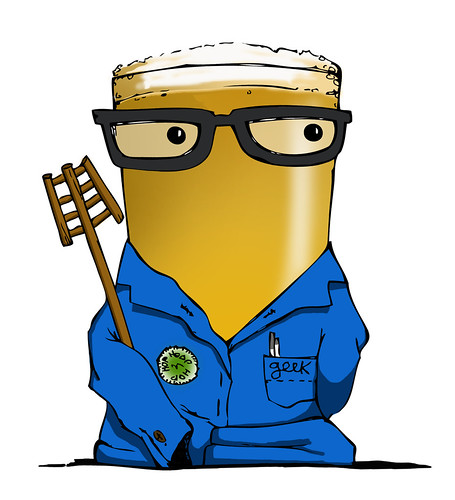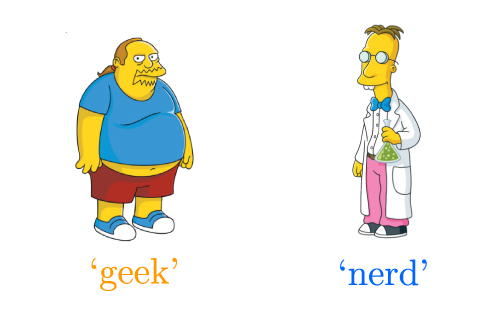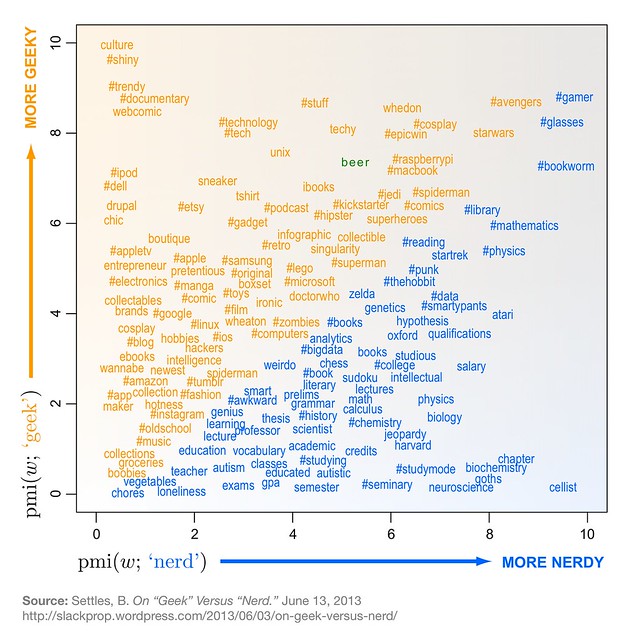![]()
The definitions of how we follow our passions seems to be a popular topic of discussion lately. Are we geeks, nerds, snobs, enthusiasts, connoisseurs or aficionados, or just annoying? I tackled this question in my first article for Beer Advocate magazine, way back in 2007, in “Freaks and Beer Geeks.” In that piece, I defined a geek as “an obsessive enthusiast, often single-mindedly accomplished, yet with a lingering social awkwardness, at least outside the cocoon of their chosen form of geekdom.” I’m still pretty happy with that definition, it seems to fit most of the geeks I know. And as I’m one myself — something I gleefully admitted in Living in the Silver Age for All About Beer — I tend to prefer being around other geeks. In my experience, we tend to run in packs. We’re tribal.

Here’s what I said in early 2007.
Beer Geeks. You probably know one of us. Hell, if you’re reading this magazine you may be one, too. And even if you don’t or you aren’t, you probably know what we’re talking about. We’re the Trekkies — excuse me — Trekkers of the beer world. You can find us at our countless conventions — a.k.a. beer festivals — wearing the uniform: beer t-shirt (occasionally tie-dyed), denim, baseball cap with brewery logo and in winter a hoodie, ditto logo. We’ll go anywhere in the world to find great beer.
We are also known by other names: snob, fanatic and hophead, among others. But fanatic never quite caught on, hophead is generally reserved for fans of IPAs and other hoppy beers, and snob never crossed over, retaining its mostly derogatory meaning. Originally, a snob was someone who made shoes, a cobbler, before migrating to a person of the lower classes who wants to move up and then on to its present meaning of a person who places too much emphasis on status or “a person who believes that their tastes in a particular area are superior to others.”
Occasionally kinder, gentler terms are employed like enthusiast or aficionado, but they never seem to strike the right chord for some reason. Most of us prefer to be known simply as beer geeks though, oddly enough, the word geek meant originally a fool and later referred to the lowest rung of circus performer, one who may even have bitten the heads off of live chickens, as popularized in a 1946 novel, “Nightmare Alley,” by William Gresham, about the seedy world of traveling carnivals. In that book, to be a “geek” was to be so down and out that you’d do virtually anything to get by, no matter how distasteful or vile.
Like many old words that were primarily derogatory, its meaning has now been turned on its head. Beginning probably with the original new nerd, the computer geek, it was taken back as a source of pride. So today there are band geeks, computer geeks, science geeks, film geeks, comics geeks, history geeks and Star Wars geeks, to name only a few, all of them proud to call themselves geek, because of the shared passion that is so central to its modern meaning. Today a geek is an obsessive enthusiast, often single-mindedly accomplished, yet with a lingering social awkwardness, at least outside the cocoon of their chosen form of geekdom.
But then there’s the on-going debate about whether we, or anybody really, is a geek, a nerd, a dork, a snob, or whatever. Not that these labels matter, but they must at least a little bit, since people keep talking about them.

Beer Geek Speak last year asked Snob, Geek or Nerd…Which are you??, Anti-Hero Brewing also tackled Beer Geek vs. Beer Snob and Modern Drunkard has the Subtle Art of Beer Snobbery. The point is, do a Google search for geek vs. nerd or geek vs. snob and you’ll get a lot of hits, and most of the top ones, particularly comparing geeks and snobs, are about beer drinkers. Clearly, this is on our minds.
I think a lot of this is coming from the fact that beer is trying to climb out of the muck and ooze that has kept it down for decades, kept it a drink of of the hoi polloi, with many manufacturers more worried about quantity than quality. Changing that has been a struggle, for a variety of reasons, but the notion that beer is every bit as sophisticated and worthy of respect as any other beverage has been difficult to achieve. Why that is would make for an entire book, a very thick book even, but this endless debate over labels is just one manifestation of that, I believe. And so we see the endless comparisons to wine, which annoys many of us to no end. I’ve written extensively about my own frustration with this, and earlier today Jen Muehlbauer had a terrific piece on that very subject: Fancy beer: pinkies out or middle fingers up?
Earlier this morning, a UK colleague, Phil Mellows, shared an interesting article from Slackpropagation entitled On “Geek” Versus “Nerd”, first published this June. A more general discussion, in it author Burr Settles defines a geek as an “enthusiast of a particular topic or field,” saying “Geeks are ‘collection’ oriented, gathering facts and mementos related to their subject of interest. They are obsessed with the newest, coolest, trendiest things that their subject has to offer,” whereas a nerd he defines as a “studious intellectual, although again of a particular topic or field. Nerds are ‘achievement’ oriented, and focus their efforts on acquiring knowledge and skill over trivia and memorabilia.” He later draws a further distinction, saying this. “Both are dedicated to their subjects, and sometimes socially awkward. The distinction is that geeks are fans of their subjects, and nerds are practitioners of them.”
He then mined the data from several million tweets to create a statistical model showing geeks and nerds plotted on an x/y axis showing their relative geekiness and nerdiness. Here’s how he described the results:
The PMI statistic measures a kind of correlation: a positive PMI score for two words means they ”keep great company,” a negative score means they tend to keep their distance, and a score close to zero means they bump into each other more or less at random.
With that in mind, here is a scatterplot of various words according to their PMI scores for both “geek” and “nerd” on different axes (ignoring words with negative PMI, and treating #hashtags as distinct):
And here is the plotted chart, though I added beer since his data didn’t include beer geeks or beer nerds. And frankly, I just picked a hole where I thought beer might fit, but I really can’t say where beer would properly fit along the continuum. Where do you think it belongs?

Click here to see the original chart full size.
To me, this is interesting stuff, even though in the grand scheme of things none of it really matters. As long as you’re comfortable in your own skin and know who you are, what people call you you or even how you label yourself means almost nothing. But where we fit into the world does matter, at least to each of us, so I think that’s probably why I find this fascinating. We may not be able to pick our family, but our friends, our passions and the tribes we join do matter deeply and on a very personal level. They form a part of the architecture by which we define ourselves. I identify myself as a beer drinker, and that means something to my self-image, as I imagine such labels do to most of us. It’s how we see ourselves and present ourselves to the world. It only seems to go wrong when other people choose the labels for us. For example, I’m fine with geek, and nerd doesn’t bother me, but I don’t care for snob, even though I can think of plenty of instances when I have been a snob. In part, it’s a perception of the words as labels themselves. They’re not static, but in constant flux, their meaning changing subtly all the time.
And here’s one final bit of interest. In the comments, there’s one from a Hannah Fry, who’s the host of Number Hub, part of a British YouTube channel started by James May called Head Squeeze. After this post was initially published, she entertainingly devoted one of her weekly videos to the question of what distinguishes geeks and nerds. Enjoy.

Proud to be a beer geek – call me a nerd & I’ll be up in your face in a hearbeat. Nerds are socially clueless; geeks like to mingle.